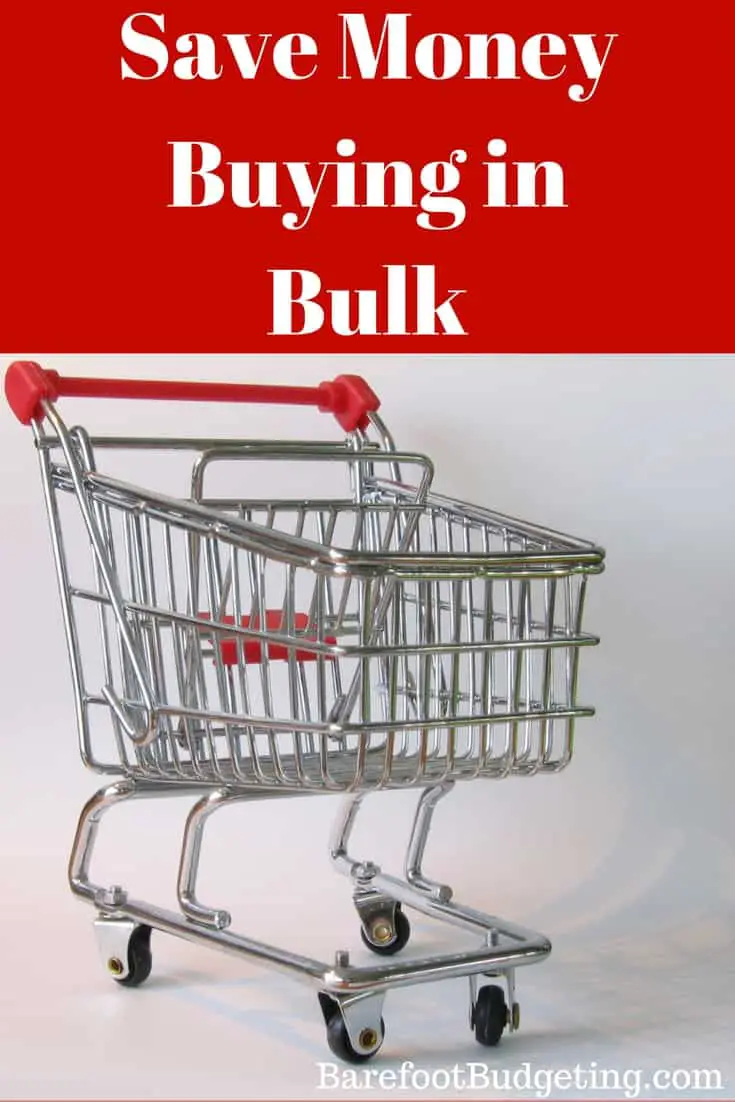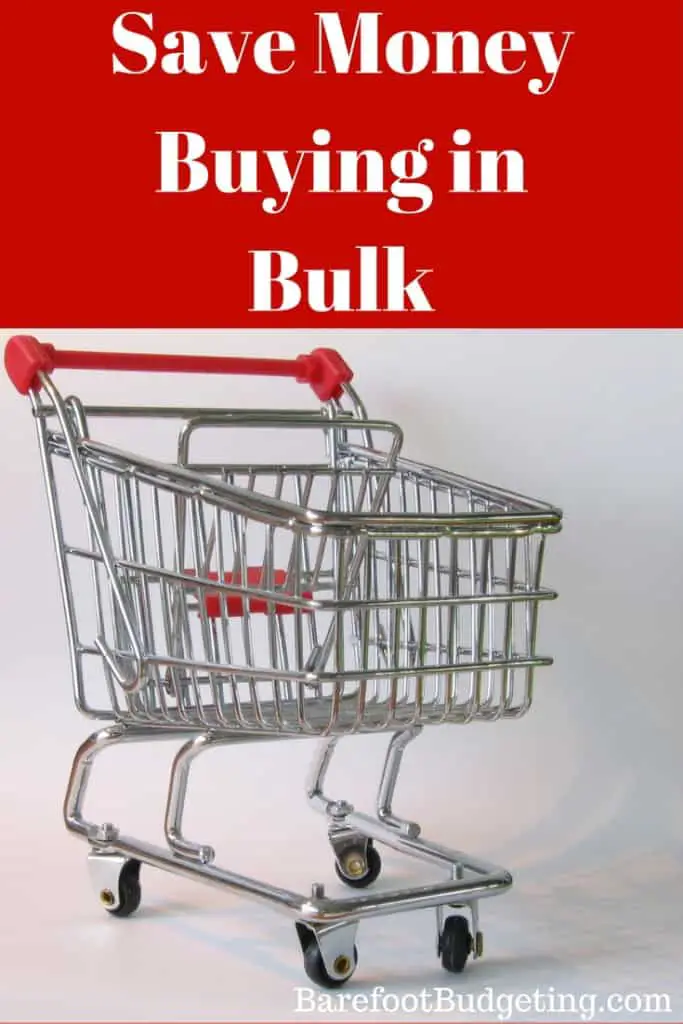*This post may contain affiliate links. As an Amazon Associate we earn from qualifying purchases.
Let’s talk a little about How to save money buying in bulk. You’ve probably heard that you can save money buying in bulk. Most of us have and even if you don’t have a large family, there are savings to be had from buying this way. That said, not everything will save you money. The idea of “the more you buy, the more you save” can sometimes be misleading.
If it’s tricking you into buying things you normally wouldn’t, then it’s not really a benefit or savings anymore.
Let’s look at how to save money buying in bulk.
1. Buy The Right Items
First, you need to make sure you purchase the right items when buying in bulk. There are certain things you can really save on when buying in bulk. These include toilet paper, soap and shampoo, office supplies, toothbrushes and toothpaste, non-perishable food, and detergents.
2. Don’t Overuse
Sometimes when you buy in bulk, it causes you to overuse something because it’s there or because you want to use it before it goes bad. If buying in bulk is making you overuse, you’re not really saving at all because you’re consuming more of that item or product.
3. Don’t Buy What You Don’t Need
As we mentioned before, sometimes buying in bulk encourages you to buy things you really don’t need, simply to get a deal. The items we listed above like toilet paper and hygiene items, are things you will eventually use. It makes sense to buy these items in bulk but avoid buying things you don’t really need, no matter how great the sale.
4. Don’t Buy Items You’ve Never Tried Before
It might be a good deal but what if you hate it and won’t use the rest of it? Then you’ve wasted money.
5. Always Look At The Price Per Unit Cost Of The Item
When buying in bulk, you want to make sure the cost per unit is as low as you can get it. This is what you should be looking for when shopping for good bulk deals.
6. Use Coupons When Buying In Bulk
It’s the best of both savings world and it’s completely allowed. When possible, use coupons when buying in bulk and save even more.
These are just a few ideas on how to save money buying in bulk. As you can see, it really can benefit you when done correctly but not every item at Costco or Sam’s Club is right for your needs. Don’t grab it just because it’s a deal. Make sure you’re going to use it (all of it) first.
There are plenty of ways to save cash when shopping for household items like toilet paper, cleaning products and food. Discount stores offer steeply marked down merchandise as well as sales, coupons and freebies abound online and off.
But with all those options available, it can be tough to figure out exactly what kind of savings you’re getting without diving into your bank account.
So let’s say you want to buy some toothpaste, shampoo, deodorant and other personal care items. How would you determine whether the lowest prices come from purchasing the smallest amount possible (which means paying higher per-item cost), or choosing larger amounts (which mean saving money overall)?
It depends on what you plan to use the product for. For example, if you only need two bottles of mouthwash instead of three, going with quantity will most likely net you a lower total bill because of shipping costs. If you’re using this bottle of stuff every day and don’t mind waiting until next month’s shipment, however, purchasing just two might not make sense unless you really need them.
One thing we can count on is that big box retailers have figured out how to squeeze maximum profit margins out of their inventory by offering huge volume purchases. The same goes for department store chains and supermarkets. Smaller family-owned businesses may also try to compete with these corporations’ low prices by cutting corners where necessary.
Regardless, if you’re planning a major purchase, you’ll probably end up comparing different brands and types of each item so you can find the best bang for your buck. That said, here are a few general guidelines to help keep your spending within reason.
How Does Bulk Shopping Work?
You already know about large chain retail outlets such as Wal-Mart and Target, and discount warehouses like Sam’s Club. What many people aren’t familiar with though, are the less conventional places that sell discounted supplies. These include grocery wholesalers, warehouse clubs and liquidation centers.
All of these establishments specialize in selling high volumes of common household goods at rock bottom prices. They usually advertise “bulk” packages that consist of several units rather than single items. The average package contains anywhere between 10 to 40 pieces (depending on what the item is) of an individual type of consumer product.
Wholesale distributors serve both manufacturers and consumers by keeping inventories fresh and affordable through periodic shipments of popular items. These companies typically stock everything from pet foods to office equipment to car parts. To receive these goods, customers must first sign agreements promising to maintain confidentiality regarding the distributor’s business practices.
Some wholesale suppliers require buyers to agree to order specific quantities, while others allow greater flexibility. Wholesale orders are made based on projected demand, so pricing isn’t set in stone. This gives the company room to negotiate special offers with vendors.
Warehouse clubs were originally created to provide shoppers access to quality name brand goods at reasonable prices. Nowadays, memberships range from $5 to over $100 per year and feature a wide variety of nonfood products including electronics, clothing, toys, home furnishings and automotive accessories. Warehouse club membership cards often give users exclusive benefits such as early bird specials, free samples, travel vouchers and loyalty points programs.
Liquidators are individuals who hold onto unsold inventory after production has ended. Once the goods leave factories, warehouses or distribution centers, they become part of a pool of similar products. Then someone comes along to put together bundles of these items for sale.
Liquidated goods could still contain factory defects or imperfections, and that’s why liquidation prices tend to be slightly cheaper than market values. However, these bargains generally won’t last long since liquidators often turn around and resell the goods elsewhere before too much time passes.
Now that you understand how the system works, read on to learn when to take advantage of bulk pricing.
When You Should Buy In Bulk?
As mentioned earlier, deciding whether to purchase small quantities versus bigger ones does depend upon what you intend to use each item for. Here are some general rules of thumb to follow during your next trip to the supermarket.
Toilet Paper/Paper Towels – Purchase enough to last a week or longer. When ordering multiple rolls, ask for extra packaging and instructions on how to wrap them securely. Also check expiration dates and avoid double-wrapping.
Shampoo/Conditioner – Opt for minimum packs whenever possible. Most shampoos come in 4 oz. containers, but you can easily stretch them out for months by splitting the container in half.
Laundry Detergent – Try to stick to 2 lb. boxes when placing your order. Bigger boxes are especially helpful for families with lots of kids.
Baby Products – A baby shower gift certificate makes a nice present, but babies change diapers quickly! Stock up on diaper cream and wipes now and restock again later.
Cooking Oil – Use olive oil instead of vegetable shortening or butter on pasta sauce recipes. Extra virgin olive oils have antioxidants, making them healthier alternatives to saturated fats found in animal lard.
Dishwashing Soap – After washing dishes, rinse thoroughly under hot water, adding 1 tablespoon vinegar and 1 cup baking soda. Add 3 cups of salt and run the dishwasher twice as fast as usual. Repeat once or twice more.
Nonstick Cookware – Grab a couple sets of pots and pans now and replace them as needed throughout the following year. Nonstick cookware lasts forever and is lightweight enough to move around the kitchen without breaking.
Mouthwash – Keep refilling empty bottles for yourself and friends. Just remember to wait a few days after opening new bottles to prevent bacteria growth.
These tips apply mainly to basic necessities like groceries, housewares and hygiene products. For pricier items such as furniture and appliances, you’ll have to decide whether you’d prefer to spend more upfront for a higher return or less monthly for a lower initial investment.
Read on to discover the pros and cons of purchasing things in bulk.
The Bottom Line On Buying In Bulk
Buying in bulk sounds like a win-win situation, right? Well, not quite. There are advantages and disadvantages to either approach depending on your needs and budget. Let’s start with the positives. Bulk packages usually carry lower overhead expenses because employees perform fewer tasks, meaning more profits go straight back to the owner. Plus, bulk orders usually arrive faster and sometimes free of charge thanks to economies of scale.
However, there are downsides to consider as well. First, you may incur additional charges from transport and handling fees. Second, if you live far away from your local brick-and-mortar retailer, you may face significant delivery delays. Third, some items simply spoil faster due to lack of proper storage. Finally, bulk packages may expose you to risk of receiving faulty or damaged goods.
Overall, the answer is pretty simple: it depends on what you want to accomplish.
If you have the room to store non-perishable items and they are significantly cheaper to buy in bulk then getting them that way is a good idea. However if you won’t use some food before it goes bad then buying it in bulk is a waste of money (even though the cost per unit is cheaper.


